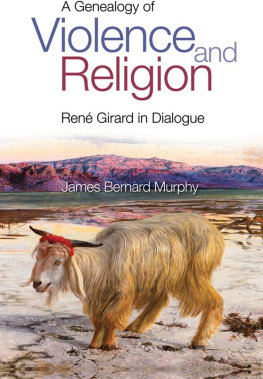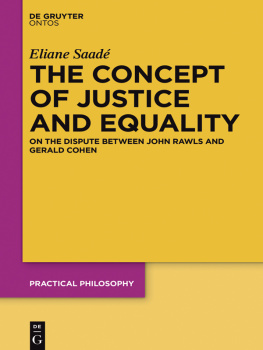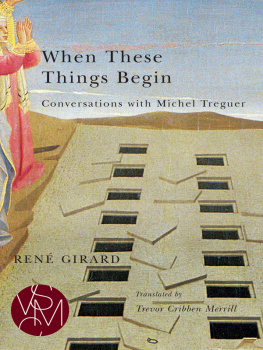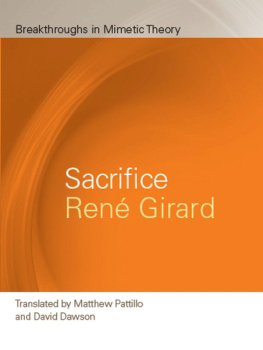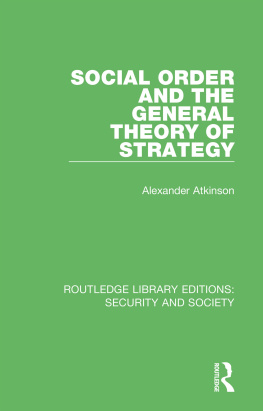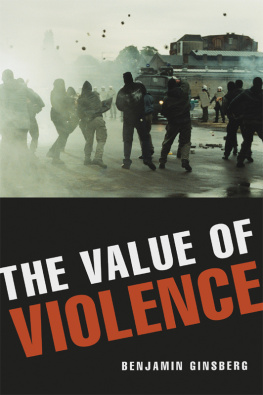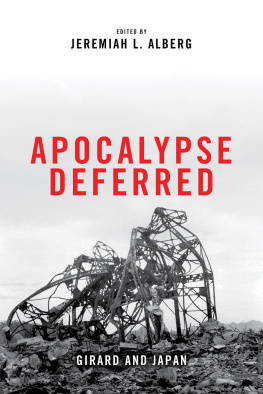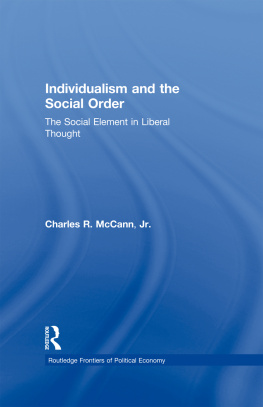
A GENEALOGY OF SOCIAL VIOLENCE
Classical and Contemporary Social Theory
Series Editor: Stjepan G. Mestrovic, Texas A&M University, USA
Classical and Contemporary Social Theory publishes rigorous scholarly work that re-discovers the relevance of social theory for contemporary times, demonstrating the enduring importance of theory for modern social issues. The series covers social theory in a broad sense, inviting contributions on both classical and modern theory, thus encompassing sociology, without being confined to a single discipline. As such, work from across the social sciences is welcome, provided that volumes address the social context of particular issues, subjects, or figures and offer new understandings of social reality and the contribution of a theorist or school to our understanding of it. The series considers significant new appraisals of established thinkers or schools, comparative works or contributions that discuss a particular social issue or phenomenon in relation to the work of specific theorists or theoretical approaches. Contributions are welcome that assess broad strands of thought within certain schools or across the work of a number of thinkers, but always with an eye toward contributing to contemporary understandings of social issues and contexts.
Also in the series
The Social Pathologies of Contemporary Civilization
Edited by Kieran Keohane and Anders Petersen
ISBN 978-1-4094-4505-0
Utopia: Social Theory and the Future
Edited by Michael Hviid Jacobsen and Keith Tester
ISBN 978-1-4094-0699-0
Fallgirls
Gender and the Framing of Torture at Abu Ghraib
Ryan Ashley Caldwell
ISBN 978-1-4094-2969-2
Torture, Intelligence and Sousveillance in the War on Terror
Agenda-Building Struggles
Vian Bakir
ISBN 978-1-4094-2255-6
A Genealogy of Social Violence
Founding Murder, Rawlsian Fairness,
and the Future of the Family
CLINT JONES
University of Kentucky, USA
First published 2013 by Ashgate Publishing
Published 2016 by Routledge
2 Park Square, Milton Park, Abingdon, Oxon OX14 4RN
711 Third Avenue, New York, NY 10017, USA
Routledge is an imprint of the Taylor & Francis Group, an informa business
Copyright 2013 Clint Jones.
Clint Jones has asserted his right under the Copyright, Designs and Patents Act, 1988, to be identified as the author of this work.
All rights reserved. No part of this book may be reprinted or reproduced or utilised in any form or by any electronic, mechanical, or other means, now known or hereafter invented, including photocopying and recording, or in any information storage or retrieval system, without permission in writing from the publishers.
Notice:
Product or corporate names may be trademarks or registered trademarks, and are used only for identification and explanation without intent to infringe.
British Library Cataloguing in Publication Data
A catalogue record for this book is available from the British Library.
Library of Congress Cataloging-in-Publication Data
Jones, Clint.
A genealogy of social violence : founding murder, Rawlsian fairness, and the future of the
family / by Clint Jones.
pages cm. -- (Classical and contemporary social theory)
Includes bibliographical references and index.
ISBN 978-1-4724-1722-0 (hardback) -- ISBN 978-1-4724-1723-7 (ebook) -- ISBN 978-1
4724-1724-4 (epub) 1. Sociology--Philosophy. 2. Social sciences--Philosophy. 3. Social
structure. 4. Violence--Social aspects. 5. Families. I. Title.
HM585.J66 2014
301.01--dc23
2013020299
ISBN 978-1-472-41722-0 (hbk)
To my Mother, Father, Sister, and Wife,
without whom this book would not have been possible:
May Isabella, Gabrielle and Tristan find a tomorrow better than today.
Contents
List of Figures
Acknowledgments
A project of this magnitude does not become a reality through the efforts of a single person. To that end, I would like to take this opportunity to thank a number of people that helped me achieve this goal through their assistance in compiling research, organizing my thoughts, and motivating me to complete this book. While some peoples influence on the text will be readily recognizable, others will not be, but this does not detract from the value that I have derived from their assistance, friendship, and support. First, then, I would like to thank my family for making this entire endeavor possible. Were it not for their love and support, and willingness to allow me the time and space necessary to pursue this goal, I would not have been able to complete this book. They have made the headaches easier to bear, the victories, however small, sweeter, and they have been a constant source of inspiration. In particular, my wife, Misty, who bore the burden of playing the roles of one and a half parents, and my mother, Charlotte, without whom I could not have achieved even half of what this book represents. There are no words.
I would like to thank my dear friend Dr. Josh Horn for his uncompromising friendship. Were it not for Joshs steadfastness when it came to telling me the trutheven when the truth was brutaland his commitment to my success, I may not have finished this book, or, I would have and it would have been noticeably worse for not having his input as a philosopher and friend. The same is true of Gary Deaton, Leigh Ann Jordan, Raven and Katrina Mineo, Brian Powell, and numerous others on the Transylvania University Forensics Team for allowing me to test out arguments and respond to challenges on many a long commute between competitions, never flagging in their interest in the project or their desire to see me succeed. Similarly, I would like to thank Dr. Scott Whiddon whose timely and heartfelt encouragement did more to spur me on to finish than anything else. Additionally, I owe a debt of gratitude to my colleagues at the University of Kentucky who tolerated innumerable long discussions about the most mundane minutiae; were it not for them I may have given up a number of times.
Lastly, I would like to express my deepest regards and immense gratitude to a number of people that have been intimately involved in this project, and without whom I may never have taken it on. Dr. Natalie Nenadic was instrumental in helping me understand so much of Hegels philosophy and how to piece it together with Girards theory that utilizing Hegels thought was much easier than it would have been otherwise. This, coupled with her guidance on the feminist critique of Girard, made her invaluable to me during the writing of this text. Dr. Stefan Bird-Pollans input was valuable both because he helped me to grasp Rawlsian philosophy and because of his challenges to my project that forced me to refine and polish the arguments. Additionally, I owe a debt of gratitude to Dr. Dan Breazeale who unhesitatingly aided me at the most unexpected of times allowing me to finish this project in a timely fashion. The person to whom I am most grateful, however, is Dr. Arnold Farr. Dr. Farr has been both a mentor and a friend to me during the writing of this book, and his excitement about this project, his commitment to my success, and his contributions both in commentary and conversation have helped to shape and define this project from its inception. His ability to anticipate problems, suggest sources for clarification, and point out ideas I had not yet hit upon moved this project steadily forward without requiring that I sacrifice creativity or quality. While I am indebted to all of these people, and, without a doubt, many others whom space prevents me from mentioning by name, I should point out that, in spite of everything, the arguments in this book are mine and, as such, so are the failings. I readily share the successes of this project with all those that made it possible and take full responsibility for its shortcomings.


